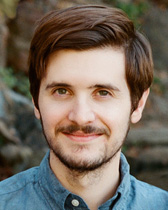Kevin Buckelew
Assistant Professor of Religious Studies

- kevin.buckelew@northwestern.edu
- Website
- (847) 467-1746
- Crowe Hall, 1860 Campus Drive, 4-137
Kevin Buckelew specializes in the study of Chinese Buddhism. He received his B.A. in the liberal arts from Sarah Lawrence College, and his Ph.D. from Columbia University's Department of East Asian Languages and Cultures.
His research focuses on Buddhism in premodern China, with special attention to Chan (Zen) Buddhism and to interactions between Chinese Buddhists and Daoists. Thematically, he is interested in embodiment, authority, gender and masculinity, agency and responsibility, work and labor, metaphor and figurative language. He has performed research in China, Taiwan, and Japan with the support of grants from the Fulbright program and the Bukkyo Dendo Kyokai. His articles have been published in Harvard Journal of Asiatic Studies, T’oung Pao, History of Religions, Numen and Journal of Chinese Religions .
His first book, Discerning Buddhas: Authority, Agency, and Masculinity in Chan Buddhism (Columbia University Press), explores how Chan Buddhists made the unprecedented claim to a level of religious authority on par with the historical Buddha Śākyamuni and, in the process, invented what it means to be a buddha in China. This claim helped propel the Chan tradition to dominance of elite monastic Buddhism during the Song dynasty (960–1279), licensed an outpouring of Chan literature to be treated as equivalent to scripture, and changed the way Chinese Buddhists understood their own capacity for religious authority in relation to the historical Buddha and the Indian homeland of Buddhism. But the claim also raised a challenging question for Chan Buddhists, who insisted that buddhahood properly transcends all worldly marks: By what signs could one recognize a Chan master as a buddha? The Chan tradition never arrived at a single conclusive answer to this question. Instead, the question animated a variety of Chan rituals, institutional norms, literary practices, and visual cultures. The book pays special attention to themes of gender and masculinity in the construction of ideal Chan mastery as a form of buddhahood, as well as to the overlooked role that tropes of sovereignty played in discussions of the ideal Chan master’s buddha-like agency and authority.
He also co-edited Buddhist Masculinities (Columbia University Press, 2023) with Megan Bryson, the first book to offer a broad treatment of masculinity in Buddhism across time and space.
His second book-length project, tentatively entitled Karma, Commerce, and Conscience: Layman Pang and Moral Responsibility in Chinese Buddhism, is a study and translation of two closely related texts that rework accumulated lore about the famous Tang-period Chan Buddhist layman Pang Yun (740–808) to stage a remarkable answer to the question: what does a bodhisattva owe, and to whom? These are the Yuan-period (1271–1368) four-act zaju play Layman Pang Unintentionally Lends Out Next-life Debts (Pang jushi wu fang laisheng zhai) and the Qing-period (1644–1911) Precious Scroll of Master Pang (Panggong baojuan). Karma, Commerce, and Conscience explores how these works crystallize centuries of Chan Buddhist innovation in formulating the moral responsibility of liberated persons in new ways that upended longstanding assumptions.
He also has a longstanding research interest in the relationship between Buddhism and Daoism, especially how Buddhists and Daoists in China have conceived of liberation in conversation with each other as bound up with particular (sometimes overlapping and sometimes competing) theories of embodiment and related bodily practices.
Selected Works
Books
Discerning Buddhas: Authority, Agency, and Masculinity in Chan Buddhism. Columbia University Press (Sheng Yen Series in Chinese Buddhist Studies), 2025.
Buddhist Masculinities. Co-edited with Megan Bryson. Columbia University Press, 2023.
Articles and Book Chapters
“Transcendents in Translation: Buddhist Affordances for Imagining Xian 仙 in China.” Journal of Chinese Religions, 51, no. 2 (2023): 171–205. .
“How Chan Masters Became ‘Great Men’: Masculinity in Chinese Chan Buddhism.” In Buddhist Masculinities, edited by Megan Bryson and Kevin Buckelew (Columbia University Press, 2023). 51-77
“Possessing Enlightenment: Sorcery, Selfhood, and Tragic Responsibility in a Chinese Buddhist Apocryphon.” Numen 70, no. 4 (2023): 337–368.
“Ritual Authority and the Problem of Likeness in Chan Buddhism.” History of Religions 62, no. 1 (2022): 1–48.
“Becoming Chinese Buddhas: Claims to Authority and the Making of Chan Buddhist Identity.” T’oung Pao 105, no. 3–4 (2019): 357–400.
“Pregnant Metaphor: Embryology, Embodiment, and the Ends of Figurative Imagery in Chinese Buddhism.” Harvard Journal of Asiatic Studies 78, no. 2 (2018): 371–411.
